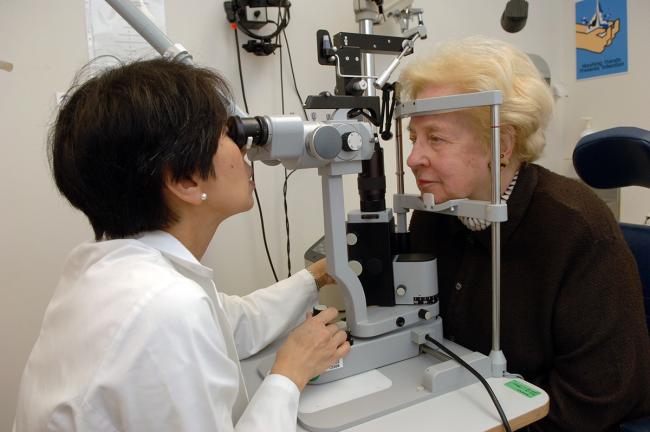NIH study confirms benefit of supplements for slowing age-related macular degeneration
Thursday, June 2, 2022
NIH study confirms benefit of supplements for slowing age-related macular degeneration

The Age-Related Eye Disease Studies (AREDS and AREDS2) established that dietary supplements can slow progression of age-related macular degeneration (AMD), the most common cause of blindness in older Americans. In a new report, scientists analyzed 10 years of AREDS2 data. They show that the AREDS2 formula, which substituted antioxidants lutein and zeaxanthin for beta-carotene, not only reduces risk of lung cancer due to beta-carotene, but is also more effective at reducing risk of AMD progression, compared to the original formula. A report on the study, funded by the National Institutes of Health, published in JAMA Ophthalmology.
“Because beta-carotene increased the risk of lung cancer for current smokers in two NIH-supported studies, our goal with AREDS2 was to create an equally effective supplement formula that could be used by anyone, whether or not they smoke,” said Emily Chew, M.D., director of the Division of Epidemiology and Clinical Application at the National Eye Institute (NEI), and lead author of the study report. “This 10-year data confirms that not only is the new formula safer, it’s actually better at slowing AMD progression.”
AMD is a degenerative disease of the retina, the light-sensitive tissue at the back of the eye. Progressive death of retinal cells in the macula, the part of the retina that provides clear central vision, eventually leads to blindness. Treatment can slow or reverse vision loss; however, no cure for AMD exists.
The original AREDS study, launched in 1996, showed that a dietary supplement formulation (500 mg vitamin C, 400 international units vitamin E, 2 mg copper, 80 mg zinc, and 15 mg beta-carotene) could significantly slow the progression of AMD from moderate to late disease. However, two concurrent studies also revealed that people who smoked and took beta-carotene had a significantly higher risk of lung cancer than expected.
In AREDS2, begun in 2006, Chew and colleagues compared the beta-carotene formulation to one with 10 mg lutein and 2 mg zeaxanthin instead. Like beta-carotene, lutein and zeaxanthin are antioxidants with activity in the retina. The beta-carotene-containing formation was only given to participants who had never smoked or who had quit smoking.
At the end of the five-year AREDS2 study period, the researchers concluded that lutein and zeaxanthin did not increase risk for lung cancer, and that the new formation could reduce the risk of AMD progression by about 26%. After the completion of the five-year study period, the study participants were all offered the final AREDS2 formation that included lutein and zeaxanthin instead of beta-carotene.
In this new report, the researchers followed up with 3,883 of the original 4,203 AREDS2 participants an additional five years from the end of the AREDS2 study in 2011, collecting information on whether their AMD had progressed to late disease, and whether they had been diagnosed with lung cancer. Even though all the participants had switched to the formula containing lutein and zeaxanthin after the end of the study period, the follow up study continued to show that beta-carotene increased risk of lung cancer for people who had ever smoked by nearly double. There was no increased risk for lung cancer in those receiving lutein/zeaxanthin. In addition, after 10 years, the group originally assigned to receive lutein/zeaxanthin had an additional 20% reduced risk of progression to late AMD compared to those originally assigned to receive beta-carotene.
“These results confirmed that switching our formula from beta-carotene to lutein and zeaxanthin was the right choice,” said Chew.
The study was funded by the NEI Intramural program (EY000546) and through contracts (AREDS2 contract HHS-N-260-2005-00007-C; ADB contract NO1-EY-5-0007; AREDS Contract NOI-EY-0-2127, and contract HHS-N-263-2013-00005-C). The AREDS2 contracts were supported by the NIH Office of Dietary Office of Dietary Supplements, the National Center for Complementary and Integrative Health, the National Institute on Aging, the National Heart, Lung, and Blood Institute, and the National Institute of Neurological Disorders and Stroke. The study took place at the NIH Clinical Center.
NEI leads the federal government’s research on the visual system and eye diseases. NEI supports basic and clinical science programs to develop sight-saving treatments and address special needs of people with vision loss. For more information, visit https://www.nei.nih.gov.
About the National Institutes of Health (NIH): NIH, the nation's medical research agency, includes 27 Institutes and Centers and is a component of the U.S. Department of Health and Human Services. NIH is the primary federal agency conducting and supporting basic, clinical, and translational medical research, and is investigating the causes, treatments, and cures for both common and rare diseases. For more information about NIH and its programs, visit www.nih.gov.
NIH…Turning Discovery Into Health®
Chew EY, Clemons TE, Agron E, Domalpally A, Keenan TDL, Vitale S, Weber C, Smith DC, Christen W, for the AREDS2 Research group. “Long-term outcomes of adding Lutein/Zeaxanthin and Omega-3 Fatty Acids to the AREDS Supplements on Age-Related Macular Degeneration Progression: AREDS2 Report #28. JAMA Ophthalmology. June 2, 2022.
Institute/Center
Contact
Lesley Earl or Claudia Costabile
301-496-5248


